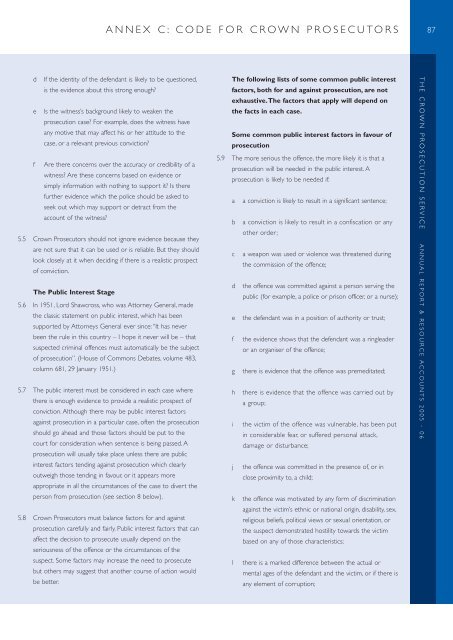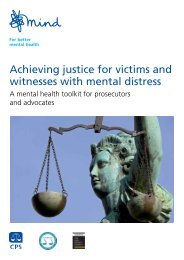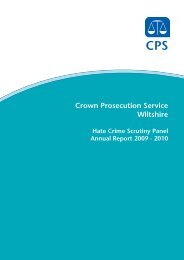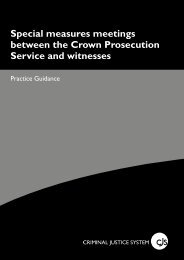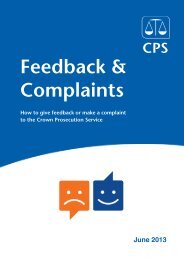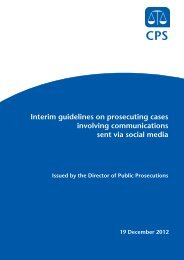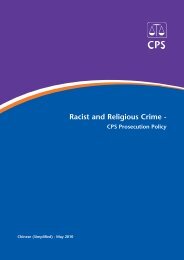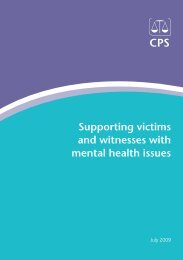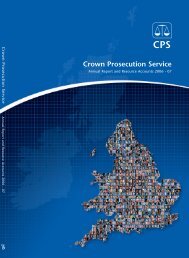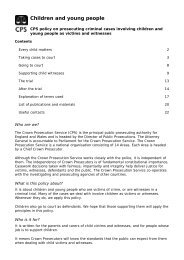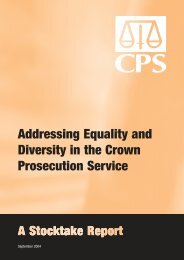CPS Annual Report 2005-2006 - PDF - Crown Prosecution Service
CPS Annual Report 2005-2006 - PDF - Crown Prosecution Service
CPS Annual Report 2005-2006 - PDF - Crown Prosecution Service
You also want an ePaper? Increase the reach of your titles
YUMPU automatically turns print PDFs into web optimized ePapers that Google loves.
ANNEX C: CODE FOR CROWN PROSECUTORS 87<br />
d If the identity of the defendant is likely to be questioned,<br />
is the evidence about this strong enough?<br />
e Is the witness’s background likely to weaken the<br />
prosecution case? For example, does the witness have<br />
any motive that may affect his or her attitude to the<br />
case, or a relevant previous conviction?<br />
f Are there concerns over the accuracy or credibility of a<br />
witness? Are these concerns based on evidence or<br />
simply information with nothing to support it? Is there<br />
further evidence which the police should be asked to<br />
seek out which may support or detract from the<br />
account of the witness?<br />
5.5 <strong>Crown</strong> Prosecutors should not ignore evidence because they<br />
are not sure that it can be used or is reliable. But they should<br />
look closely at it when deciding if there is a realistic prospect<br />
of conviction.<br />
The Public Interest Stage<br />
5.6 In 1951, Lord Shawcross, who was Attorney General, made<br />
the classic statement on public interest, which has been<br />
supported by Attorneys General ever since: “It has never<br />
been the rule in this country – I hope it never will be – that<br />
suspected criminal offences must automatically be the subject<br />
of prosecution”. (House of Commons Debates, volume 483,<br />
column 681, 29 January 1951.)<br />
5.7 The public interest must be considered in each case where<br />
there is enough evidence to provide a realistic prospect of<br />
conviction. Although there may be public interest factors<br />
against prosecution in a particular case, often the prosecution<br />
should go ahead and those factors should be put to the<br />
court for consideration when sentence is being passed. A<br />
prosecution will usually take place unless there are public<br />
interest factors tending against prosecution which clearly<br />
outweigh those tending in favour, or it appears more<br />
appropriate in all the circumstances of the case to divert the<br />
person from prosecution (see section 8 below).<br />
5.8 <strong>Crown</strong> Prosecutors must balance factors for and against<br />
prosecution carefully and fairly. Public interest factors that can<br />
affect the decision to prosecute usually depend on the<br />
seriousness of the offence or the circumstances of the<br />
suspect. Some factors may increase the need to prosecute<br />
but others may suggest that another course of action would<br />
be better.<br />
The following lists of some common public interest<br />
factors, both for and against prosecution, are not<br />
exhaustive.The factors that apply will depend on<br />
the facts in each case.<br />
Some common public interest factors in favour of<br />
prosecution<br />
5.9 The more serious the offence, the more likely it is that a<br />
prosecution will be needed in the public interest. A<br />
prosecution is likely to be needed if:<br />
a a conviction is likely to result in a significant sentence;<br />
b a conviction is likely to result in a confiscation or any<br />
other order;<br />
c a weapon was used or violence was threatened during<br />
the commission of the offence;<br />
d the offence was committed against a person serving the<br />
public (for example, a police or prison officer, or a nurse);<br />
e the defendant was in a position of authority or trust;<br />
f the evidence shows that the defendant was a ringleader<br />
or an organiser of the offence;<br />
g there is evidence that the offence was premeditated;<br />
h there is evidence that the offence was carried out by<br />
a group;<br />
i the victim of the offence was vulnerable, has been put<br />
in considerable fear, or suffered personal attack,<br />
damage or disturbance;<br />
j the offence was committed in the presence of, or in<br />
close proximity to, a child;<br />
k the offence was motivated by any form of discrimination<br />
against the victim’s ethnic or national origin, disability, sex,<br />
religious beliefs, political views or sexual orientation, or<br />
the suspect demonstrated hostility towards the victim<br />
based on any of those characteristics;<br />
l there is a marked difference between the actual or<br />
mental ages of the defendant and the victim, or if there is<br />
any element of corruption;<br />
THE CROWN PROSECUTION SERVICE ANNUAL REPORT & RESOURCE ACCOUNTS <strong>2005</strong> - 06


